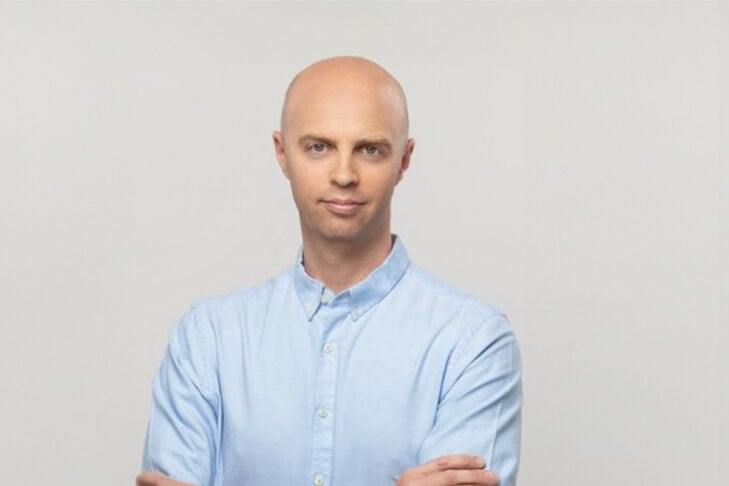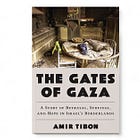One Million Took to the Streets: Why?
A conversation with journalist, author and October 7 survivor, Amir Tibon
Following is a transcript of a conversation I had with Amir Tibon on Monday night. Our focus was on the day before, when approximately one million Israelis took to the streets to voice their deep concern with the direction in which Prime Minister Netanyahu continues to take the country. We get into the renewed offensive on Gaza – which is being undertaken contrary to the expert advice of every security and intelligence expert in the country, - including the IDF Chief of Staff - not to mention the deeply fatigued population.
Amir Tibon lived with his family on Kibbutz Nahal Oz in the area know as the “Gaza envelope” in Israel; the part of the country abutting the border with the Gaza Strip that has been hammered for years with mortar and rocket attacks. On October 7, Amir huddled in his safe room with his wife and two very young daughters, hoping and waiting. In the late afternoon, his father – retired IDF General Noam Tibon – knocked on the sealed shutter of the safe room window. “Sabba is here.” Grandpa is here, Tibon’s older daughter said. They knew they were finally safe. And sobbed with relief.
The story of the journey of Noam and his wife, Gali, into the heart of darkness on that black sabbath, is told in Amir’s superb book that was published almost one year ago: The Gates of Gaza: A Story of Betrayal, Survival and Hope in Israel’s Borderlands. I highly recommend this superbly written and told story of terror, bravery and with some fascinating and little-known history of this troubled corner of the country.
In September, a documentary film chronicling the Tibon family story of October 7 will be premiering at the Toronto International Film Festival. And you bet I’ll be there.
At the conclusion of this interview we provide links to additional podcast and written material we have published that are on topic and may be of interest.
Now, to my conversation with Amir Tibon.
Amir Tibon
STLV: When we spoke briefly yesterday [Sunday], you said that for the first time in a long time you feel optimistic.
Why, what, what gives you this sense of optimism now?
Amir Tibon: I think for a long time there was a sense that the hostages are doomed. That there is no way to save 20 hostages who are there still alive. One of them is my friend, my neighbor, Omri Miran from Kibbutz Nahal Oz. And that the bodies of the other 30 hostages, maybe several, you know, a handful will be found at some point, but all the others will become new Ron Arads.
(Ron Arad was an Israeli Air Force navigator who parachuted from his plane and fell into the hands of Shiite terrorists in Lebanon in 1986. The pilot was rescued by Israeli forces operating in the area.) After a few years he went missing and his body was never retrieved. And it's a scar – his fate - an open wound for Israeli society. And just imagine having 20 more like that.
So there was a sense that this whole thing is hopeless. That the negotiations have hit a wall. That we're stuck. Stuck between Hamas and Netanyahu.
That no matter how much we're sending more and more troops and soldiers are dying there…it's only causing their extremist, fanatic, insane leaders to double down on their current position.
And Prime Minister Netanyahu just wants to remain in power and cannot lose his far right coalition. And there was this sense that the Israeli public has given up, basically. That this has become the “new normal”. Right?
Life goes on, the hostages are there, soldiers die. And there's nothing we can do about it. And Sunday was the first time that something snapped, something changed and you saw a huge outpouring of people on the streets, going out to the junction near their cities, near their local councils, and everybody eventually gathering at this gigantic rally on Sunday night at Hostage Square in Tel Aviv. Hundreds of thousands of people sending a message.
I think that message was received in the Prime Minister's office in Jerusalem. And in the White House, and also I hope it reached the hostages themselves in the tunnels of Gaza. We know they are sometimes exposed to media from Israel over there because the hostages who have returned have said so.
And the message that we sent from this gathering was that we don't give up, we don't forget, and we're willing to continue fighting for you. I think it's a very important message.
STLV: You said that you think that that message was received in the Prime Minister's office, and of course we woke up this morning to a comment from Netanyahu saying that when you go out on the streets like that all you do is strengthen Hamas and you hurt Israel.
Amir Tibon: I think that's the thing. It shows you that he's worried. It shows you that the protests…that the fact Israelis still care – it bothers him. Because otherwise he wouldn't respond this way. He wouldn't go on the attack this way.
It would be very easy to just dismiss these protests. They were led by the families of the hostages, most of them. And by a large group of bereaved families. The October Council - it's an organization of many hundreds of bereaved families and people from the Gaza border area who lost their friends and their homes.
And, and he could have just said, “I respect the people, but I'm going to continue running this issue as I have been doing. Something very sober and moderate like that. But the fact that he went on the attack and tried to humiliate these people and, and, and accused them of, of strengthening Hamas, it shows you that this is applying pressure on him.
He doesn't want this to happen. And the reason is obviously because the issue of the negotiations for the hostages is much more complicated than how we see it in most of the media coverage. It's, it's really not a binary issue. Obviously, we all blame Hamas for carrying out the October 7 attack and kidnapping these people.
The vast majority of them are civilians. We also have to acknowledge that the way Netanyahu has been conducting the negotiations has been a failure because - if after 22 months you still have 50 hostages in the hands of Hamas - you've failed. His strategy is not working.
This protest is an acknowledgement that something is not working right. That whatever he's doing is not bringing results. So that's, that's the first reason I think it's, it's problematic for him. And the second reason is problematic for him is that I on the global stage, this shows what Israelis really care about. What Israelis are willing to go out and fight for. And that is saving the [00:10:30] hostages. Israelis are willing to make difficult decisions and difficult concessions to save our hostages. And if Hamas is not willing to enter the realm of a possible agreement, we will all support applying more military pressure on Hamas.
But first of all, we have to be convinced that our own government is willing to do whatever it takes to reach an agreement. And right now what you saw yesterday was a vote of no confidence from the public.
STLV: And we also saw on Sunday night the release of new poll results on channel 12, which were quite dramatic.
Amir Tibon: Yes. I think what we saw in that poll was the Netanyahu bloc receiving 49 seats. (A minimum of 61 of 120 seats in the Knesset is needed to form a coalition government.)
STLV: Correct.
Amir Tibon: And the anti Netanyahu bloc, which is very ideologically diverse. I don't know if you can even call it a bloc, because it stretches all the way from the far left to right wing parties that are critical of Netanyahu.
But that entire weird organism receives 71 seats, and the most crucial aspect is that out of those 71 seats you have 61 without the Arab parties. Who are always more difficult in Israel to govern with. Unfortunately. I say – unfortunately - because I think that for the good of the state of Israel, it, it would be the right thing to do to have Arab representation in the government. Just like we have Arabs in every hospital. And everywhere you go in the country, really. But I understand the complexity because right now the Arab, parties are – well, at least one of them is completely off the table for anybody, for political partnership.
Israelis are unhappy with how the war in Gaza is being conducted. And the fact that 22 months into the war we still have 50 hostages there…we still have soldiers dying there. The communities on the border with Gaza are not fully recovered, and the fact that the war is continuing is making life quite difficult in that part of the country. People are just looking for someone to do it better than the current government is.
STLV: It’s quite astonishing actually, that you have such a diverse cross section of people from the left to the right, security professionals, the head of Mossad, former heads of Mossad. I mean, you have everyone lined up and saying, what are we going to do now that we have not done for the last 22 months in Gaza?
What we do there may well result in the hostages being killed.
Amir Tibon: There was the, the ceasefire deal of January 2025, which was signed under Biden, but I give most of the credit to Trump and Witkoff. It worked pretty well until early March. Hamas engaged in provocations and, and dragged and played for time, but eventually they released every one of the 33 hostages that were meant to come out in that phase of the deal.
And then of course what we had was a decision by the Israeli government to renew the war. Since then, 45 soldiers have have died. How many more of our boys are we going to lose? If now we send them again into Gaza City where we already fought in the early months of the war, and then what happens when we complete this operation and, and hostages die, and soldiers die, and now we are controlling 2 million people?
We have to feed them. We know what the world is expecting from us on that front. We know all the pressure will be applied on Israel and even if we do much more than other countries do. And we apply more resources to this, we're still gonna get dragged in the mud and blamed for every bad thing that happens.
Is this really something the state of Israel should commit to right now?
STLV: So as you know, Hamas has just come back with a response to Israel regarding a new hostage deal and they are saying that the “ball is in Israel's court”
Bibi responded by saying Hamas is now under “atomic pressure”.
Amir Tibon: I think, I think he's also under atomic pressure. I think both of them are, I think Hamas is under a lot of pressure from Egypt and Qatar.
Because these two countries, they want this to end. They, they want this nightmare to end as well. Qatar, we can talk about, we can devote many hours to talk about all their shenanigans and their negative influence. But I think at this point in time the returns for Qatar are diminishing and there is a bigger spotlight on them and they would like it to end.
Egypt obviously wants it to end because they don't want Palestinians to cross the border into their territory. And I think Netanyahu is under pressure from the Israeli public and under international pressure from a lot of countries. And politically he is losing support because he doesn't really have a plan.
STLV: It's really been a very reflexive 22 months.
Amir Tibon: Exactly. This is a great point, Vivian. We really saw three wars play out over the last 22 months. There were two wars that Israel planned meticulously, carefully and for many years; the wars against Hezbollah and Iran. And when you plan a war and then you execute it according to your plan.
You saw two well executed wars. With clear goals, with an exit strategy. They didn't drag on for too long.
In Gaza, which is the third war, you see an unplanned war. A war that was forced on Israel by Hamas. We didn't start it. We were surprised and we've been catching up ever since.
And even now we are catching up because look what they did after we went into this operation. Gideon’s Chariots.
We blocked all the aid from coming into Gaza thinking that this would create presure on Hamas to resume negotiations. Instead, they used the decision to not bring in aid as a weapon against us and increase the international pressure on us.
And now we are bringing tons of aid inside. Yeah. Without any hostages being released.
Another aspect of this is something you've been writing a lot about, and I respect you so much for raising this point again and again. We need more soldiers if we really want to do all this stuff, right?
I mean, take over Gaza, run the lives of 2 million people there. Continue our presence in Syria, Lebanon, Hezballah, manage Iran, keep the West Bank. We need a ton of soldiers for all that. Now the enemies of Israel, they're all watching and, and, and they know we don't have enough soldiers right now.
So if you're serious about this stuff, the first thing the government should do is recruit another 10,000 soldiers. Instead, what they're doing is passing this obnoxious deal to exempt the haredim from military service.
Where’s the strategy here? If you're going for this war on all fronts all the time kind of policy, at least convince the, the enemy that you can do it successfully because you have a larger army than you had on October 7th. Today we have a smaller army than we had on October 7th because more than 900 soldiers died. Thousands upon thousands have been wounded. You have thousands with PTSD, you have reservists who are not showing up anymore. And instead of recruiting more soldiers, the government is playing politics. So obviously the other side is watching that.
STLV: Ron Dermer. Based on leaked reports – pretty normal around here – we believe that when Netanyahu initially spoke of reviving the military operation in Gaza that Dermer dissented.
When Bibi first said on that Monday after those horrific videos were released of Rom Braslavski and Evyatar David, that Bibi said: “OK. That's it. We're going in. We're occupying all of Gaza. And Dermer, Tzachi Hanegbi – the National Security Adviser – everyone in the security cabinet but Ben Gvir and Smotrich disagreed.
Now, they all soon fell into line and they voted to support yet another invasoin. But very soon after that happened, Dermer announced that he was leaving political life at some point before the next election. It was a classic “gotta spend more time with the family” statement. “I promised my wife I’d only go in for two years and now it’s been more than three.” Which is very likely true. But the timing – coinciding as it does with this disclosure of him disagreeing with Netanyahu - what do you know about that, and how significant is that?
Amir Tibon: I've been reading about it in the news. I don't know anything beyond that. I haven't spoken with Ron Dermer in a long time, despite the fact that we knew each other from my time in Washington. We even met in his office two months before October 7th.
And he knows I live in the otef (Gaza envelope area), and he probably heard about my family story from that day. He never reached out to me.
And, and other people in, in politics who I have written about harshly and criticized, did find the humanity to send a text message, you know?
Like, how's your family? Are all your neighbors Okay. Do you know anybody from the hostages? Humane questions that
I don't know what his plans are. I hope only for good things for him and his family.
I think he failed miserably in his role as the Strategic Affairs minister of the State of Israel.
That’s been his job since January 1st, 2023. The biggest strategic disaster in the history of the country happened on his watch.
So what does that tell you? And, and then of course, he was appointed in February to lead the hostage negotiations.
Since then, the negotiations have been completely stuck. Both in the role as Strategic Affairs Minister, and then in the six months since he took over as lead hostage negotiator.
STLV: We have a partial deal offer from Hamas, we understand, on the table.
What do you think that this government is gonna do?
Amir Tibon: Can I say what I hope it does?
STLV: Of course
Amir Tibon: I hope the government will take the deal and immediately begin negotiations, not play for time. Not say, “Oh, we'll begin negotiations after 10 days, after 20 days, or stuff we've heard before. No, Immediately. Begin negotiations for the remaining 25 hostages.
Reach a quick deal to end the war, get all the hostages out, rebuild the army. We have to rebuild the IDF and fix all of the terrible things that happened in the IDF that led to October 7th; rebuild the communities that were hurt on October 7th in the south and in the north, rebuild Israeli society around the value of solidarity, looking out for one another. Having a strong, prosperous country. Rebuild our communications strategy internationally. Our strategy to combat antisemitism in the world, our connection to Jewish communities. All of these things have to be done. Yeah. And we can't do everything at once, but we have to do it.
And of course we need a state commission of inquiry. This is something you and I have been talking about - a commission of inquiry of October 7th to learn from the mistakes.
This is what I hope the government will do.
What it'll actually do - I'm afraid to say, but, but this is what I'm hoping for.
Since our conversation on Monday evening, PM Netanyahu has continued to say publicly that we will accept a one-time deal for the release of all hostages or no deal. For two days now, he has been consulting with various officials but there has been no decision make as to whether to accept Hamas’ offer to free ten living hostages.
Also since Monday, we learned that the IDF has sent out 60,000 call-up notices to reserve soldiers, many of whom have just returned to their families following hundreds of days of service. The possibility that many will simply not show up is real. As a related aside, there are approximately 80,000 haredi men of draft age. Had they been mobilized immediately after October 7 – even just 20% of them – that would have addressed any troop shortage that the IDF faces today. That this situation persists is unconscionable.
Also today, groups of haredi men blocked highways throughout the country in protest of the possibility of the IDF draft applying to them going forward.
Show your support for STLV at buymeacoffee.com/stateoftelaviv
Additional articles and podcasts featuring Amir Tibon and his story:
Amir Tibon is an award-winning diplomatic correspondent for Haaretz, and previously served as the paper’s correspondent in Washington, D.C. He is the co-author (with Grant Rumley) of The Last Palestinian: The Rise and Reign of Mahmoud Abbas, the first-ever biography of the leader of the Palestinian Authority. Amir, his wife, and their two young daughters were evacuated from their home in Kibbutz Nahal Oz after the October 7 attack, and are currently living in temporary housing in north-central Israel.











Will this also be released as a podcast episode? Thank you!